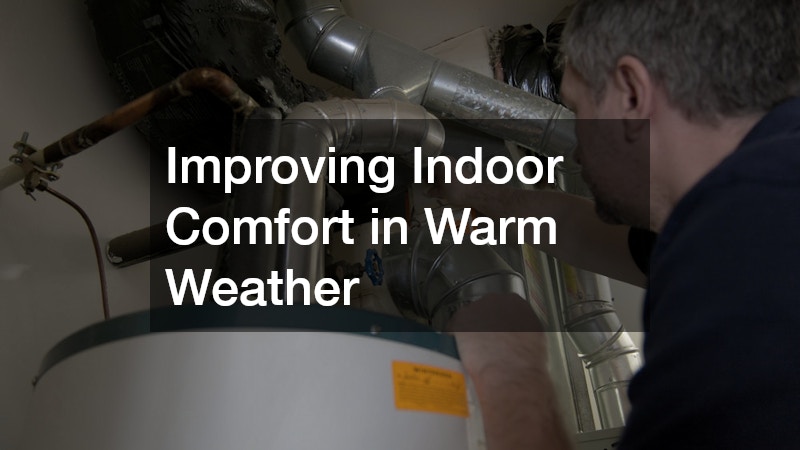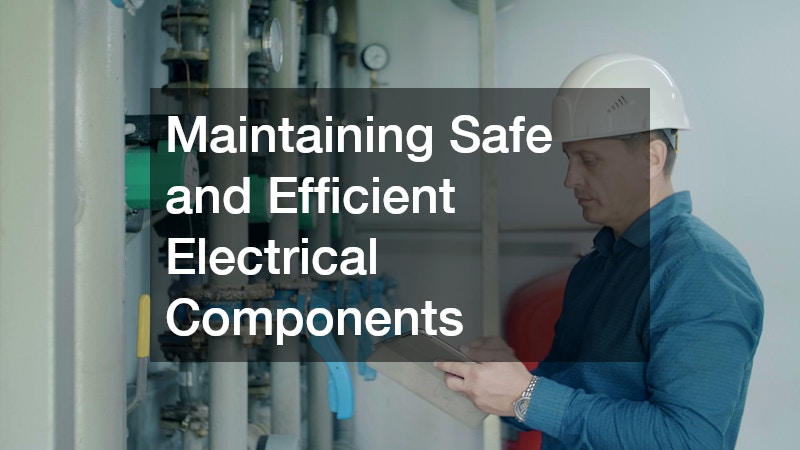Your home’s heating, ventilation, and cooling systems are vital for maintaining a comfortable and safe living environment year-round. They regulate indoor temperatures, improve air quality, and keep energy costs manageable. However, just like any other part of your home, these systems require consistent care to operate at peak performance. That’s where good home repair advice can make all the difference. By understanding how to maintain each component, from the cooling units in summer to the heating units in winter, you can prevent costly breakdowns, extend the lifespan of your equipment, and keep your home running smoothly.
This guide provides practical strategies for maintaining efficiency across your home’s comfort systems. Whether you’re tackling small maintenance projects yourself or deciding when it’s best to call in professionals, the tips here will help you make informed decisions. We’ll explore preventive measures, seasonal upkeep, and signs that your systems need attention. With the right approach, you can avoid unexpected repair bills and enjoy peace of mind knowing your home is well cared for.
Another reason to follow thorough home repair advice is that it helps maintain your property’s resale value. Buyers are more likely to invest in a home with well-documented maintenance records and efficient systems in place. Consistent care ensures that future owners inherit a home that’s both comfortable and reliable, making your investment worthwhile over the long term.
Improving Indoor Comfort in Warm Weather

Your cooling system works harder during the warmer months than at any other time of year. One of the most valuable pieces of home repair advice is to schedule regular maintenance before the peak of summer. This includes cleaning or replacing filters, inspecting coils for debris buildup, and ensuring refrigerant levels are adequate. A clean and well-maintained cooling system won’t only operate more efficiently but also save you money on utility bills.
Engaging air conditioning services at the start of each season is a smart preventive step. Professionals can detect issues like worn belts or faulty capacitors before they lead to complete system failure. Additionally, keeping the surrounding area of your outdoor unit clear of plants, leaves, and other obstructions helps airflow, improving performance. Remember that efficiency doesn’t just depend on the machine itself but also on how well your home retains cool air, so consider sealing gaps in windows and doors.
Another way to ensure indoor comfort is to upgrade to a programmable thermostat. This allows your cooling system to run only when needed, reducing unnecessary energy usage. A thermostat set to adjust temperatures while you’re away can help lower monthly utility bills without sacrificing comfort. Lastly, shading your home from direct sunlight can have a surprising impact. Using blinds, curtains, or even planting shade trees can reduce the heat entering your home, meaning your system doesn’t have to work as hard. These simple changes, combined with regular professional maintenance, keep your cooling setup running smoothly.
Ensuring Reliable Climate Control
Maintaining consistent indoor temperatures throughout the year requires more than just reactive repairs. Proactive care is essential, and working with experienced HVAC contractors can ensure every part of your system—from ducts to thermostats—is in top condition. This level of attention keeps the system operating at optimal capacity, which directly impacts your comfort and energy usage. Good home repair advice also includes creating a seasonal maintenance checklist. For example, in the fall, contractors can inspect your ductwork for leaks, calibrate thermostats, and test airflow. These preventive measures ensure your home remains comfortable no matter the season. Moreover, well-maintained systems are less likely to break down when you need them most, avoiding emergency repair costs.
One often-overlooked step is having contractors balance airflow between rooms. Uneven temperatures can be a sign that ducts need adjustment or cleaning. This process ensures all areas of the home get consistent heating or cooling, enhancing overall comfort. Additionally, HVAC contractors can help you evaluate system efficiency and suggest upgrades when necessary. Newer models are often more energy-efficient, and replacing outdated equipment can reduce long-term costs. Upgrading might seem like a big investment, but it can pay off in lower utility bills and fewer repairs.
Maximizing Heating Efficiency
When temperatures drop, reliable heating becomes essential. Scheduling regular inspections with specialists in heating services ensures your system is ready to perform during the coldest days of the year. This includes checking burner assemblies, cleaning heat exchangers, and inspecting venting systems for obstructions. Even minor issues, if left unaddressed, can cause significant inefficiency and higher utility bills. Home repair advice for heating systems also means paying attention to your home’s insulation. Poorly insulated walls and attics force your system to work harder, wearing it down faster. Adding or upgrading insulation, along with using programmable thermostats, can help maintain warmth more efficiently and reduce energy consumption.
You can also consider zoning systems for better heating control. By dividing your home into separate zones, you can adjust temperatures in specific areas instead of heating the entire house, which reduces unnecessary energy use. Lastly, keeping doors and windows well-sealed prevents heat loss. Applying weatherstripping or caulking around frames is an inexpensive but effective way to retain warmth. Combined with regular system maintenance, these small steps make a big difference in efficiency.
Maintaining Safe and Efficient Electrical Components

Every heating and cooling system depends on reliable electrical connections. Having a qualified electrician inspect wiring, breakers, and connection points ensures everything is functioning properly and safely. Faulty electrical components can cause system malfunctions or, in worst-case scenarios, dangerous hazards like electrical fires. Another important step is ensuring that your system isn’t overloading your home’s electrical panel. Adding large appliances or comfort systems without considering electrical capacity can strain circuits. Regularly scheduled inspections from an electrician provide peace of mind and ensure your climate systems operate without risk to your household.
Installing surge protectors is another smart preventive measure. Power surges, even brief ones, can damage sensitive HVAC components, leading to costly repairs or replacements. Protecting your investment with this small device is well worth it. Finally, keeping wiring and electrical panels free from dust, pests, or moisture will extend their life span. Simple upkeep, coupled with periodic professional checks, ensures your home’s systems function safely year after year.
Back-Up Power for Critical Systems
Even the most well-maintained systems can’t run without power, so investing in generators can be a wise decision. A backup power source ensures your heating and cooling systems continue operating during outages, maintaining indoor comfort and protecting sensitive equipment from sudden shutdowns. One piece of home repair advice that often goes overlooked is performing regular load tests on your backup generator. This ensures it can handle your household’s needs when it matters most. Routine servicing—including checking fuel levels, testing batteries, and inspecting connections—also keeps it in ready-to-use condition year-round.
You can also store extra fuel in a safe location to ensure your generator runs for extended periods during emergencies. Just be sure to follow proper storage guidelines to avoid safety hazards. Another useful step is connecting your generator to critical systems through a transfer switch. This device automatically powers essential appliances and prevents dangerous backfeeding into utility lines, which keeps your family and utility workers safe.
Keeping Warm With Proper System Care
If you rely on central heating during the winter, you know how disruptive it can be when the system fails. Timely furnace repairs are critical in preventing small problems from turning into major breakdowns. Issues like worn bearings, dirty burners, or a faulty ignition system can quickly escalate without proper maintenance.
Professionals can also check for carbon monoxide leaks, which can be dangerous if undetected. One important home repair advice tip is to install carbon monoxide detectors in key areas of your home, especially near sleeping spaces, to ensure safety alongside comfort. It’s also wise to replace furnace filters on schedule. Dirty filters reduce airflow, strain the system, and increase energy usage. Setting reminders to check them monthly during heavy use seasons can prevent performance issues. Lastly, having your furnace tuned annually helps maintain efficiency and prolongs its lifespan. Even if it appears to be working fine, hidden issues can shorten its service life if not addressed.
Enhancing Comfort With Modern Heating Methods

Radiant heat flooring is an increasingly popular way to improve comfort while maintaining energy efficiency. This system works by heating surfaces directly, providing consistent warmth without the drafts or uneven heating common in traditional systems. It’s an investment that not only increases home comfort but also boosts property value.
Regular inspections are still necessary, as even radiant heat systems require periodic maintenance. Checking for leaks in the tubing, ensuring the boiler or water heater is functioning correctly, and monitoring thermostat controls will keep the system performing optimally for years. Another advantage of radiant heat flooring is its quiet operation. Without the noise of forced-air systems, it creates a more peaceful indoor environment. You can also pair radiant heat systems with renewable energy sources, such as solar thermal panels, for further efficiency. This combination lowers utility bills and reduces your environmental impact.
Ensuring Hot Water Availability
Few things are more frustrating than stepping into a cold shower due to a broken water heater. Scheduling routine water heater repairs can prevent sudden failures, whether you have a traditional tank system or a modern tankless model. Maintenance includes flushing the tank to remove sediment, inspecting the anode rod, and checking for leaks. This is another area where home repair advice focuses on prevention. Addressing small leaks promptly can prevent water damage and costly replacements. Keeping your water heater in top condition not only ensures hot water availability but also reduces your home’s overall energy consumption.
Installing an insulating blanket around the tank can also improve efficiency, particularly in colder climates. This simple measure helps maintain water temperature and reduces strain on the heating element. Lastly, setting your water heater to the recommended temperature—usually around 120°F—saves energy and prevents scalding. This adjustment can extend the appliance’s lifespan while lowering utility bills.
Protecting Your Home’s Drainage Systems
A malfunction in your drainage system can cause severe damage to your home and compromise your heating and cooling systems. Sewer line repairs are crucial for preventing issues like backflow, foul odors, and water damage. Regular inspections can identify problems such as root intrusion, corrosion, or clogs before they escalate.
One valuable piece of home repair advice is to avoid flushing anything other than approved materials down your drains. This simple practice significantly reduces the risk of sewer line blockages and extends the life of your plumbing system. If you live in an older home, you may need to upgrade sewer lines to modern materials. This can help prevent frequent issues and improve flow capacity. Also, consider installing a backwater prevention valve to protect your home from sewage backups during heavy rains. This device stops wastewater from flowing back into your home, offering an extra layer of protection.
Ensuring Water Flow and Pressure

Reliable water flow is essential for both everyday life and the operation of certain climate systems, such as those connected to boilers or radiant heat flooring. A skilled plumbing contractor can help ensure your home’s water lines, fixtures, and connections are in excellent condition. They can also identify hidden leaks that could be increasing your utility bills.
Home repair advice in this area often includes insulating pipes in colder climates to prevent freezing. Frozen pipes can burst, causing extensive water damage and expensive repairs. Preventive maintenance from a trusted plumbing professional keeps your systems working without interruption. Upgrading old fixtures to water-efficient models is another smart move. Not only does it conserve water, but it can also improve water pressure and reduce strain on your system. Finally, scheduling annual plumbing inspections ensures that small problems are caught early. This habit prevents costly emergencies and keeps your home’s water systems running smoothly.
Keeping your home’s heating and cooling systems in top condition requires a combination of preventive care, timely repairs, and professional expertise. The most valuable home repair advice often comes down to planning ahead—scheduling seasonal inspections, addressing small issues promptly, and making upgrades that improve efficiency. By following these steps, you not only extend the lifespan of your systems but also reduce the likelihood of costly breakdowns.
From maintaining indoor comfort in every season to protecting critical electrical and plumbing connections, each part of your home plays a role in the overall performance of your HVAC setup. Whether you’re improving insulation, upgrading to radiant heat flooring, or ensuring your backup generator is ready for emergencies, every measure you take contributes to a more reliable and efficient home. Investing in routine maintenance and calling on skilled professionals when needed keeps your household comfortable year-round and safeguards your property against unexpected challenges.
Consistent maintenance is an ongoing commitment, but the payoff is significant—lower energy bills, fewer breakdowns, and a safer home. By applying the home repair advice outlined here, you can enjoy year-round comfort and confidence knowing your systems are prepared for whatever the weather brings.
